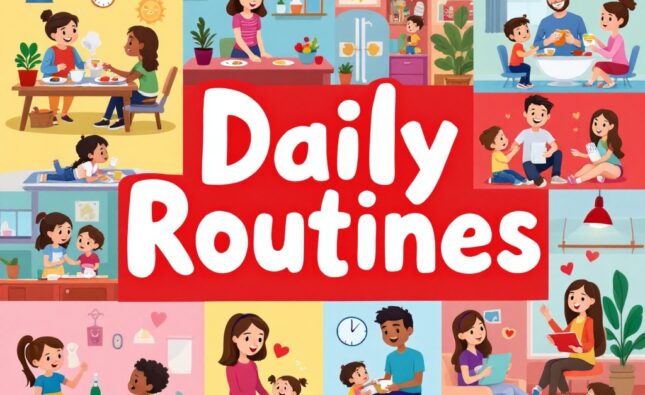The Screen Time Debate: Ever wondered if your child’s screen time habits are shaping their brain more than you realise?
If you prefer to watch the audio/video version of this article, please click here.
In this digital era, screens beckon with promises of educational enrichment, yet the reality is greater disconnection in a world where human connection is already under attack. You just have to go to a restaurant and see how many people have their phones out and have reduced attention towards their dining companions.
With new research coming out about screen time and it’s affects on children it can feel like every decision you make about screen time is shaping your child’s world in a big way. Your actions could be fostering their brilliance or dulling their shine. And do you even know? Our choices profoundly shape their development and influence their perceptions of the world, and that’s a lot of pressure.
Let’s be real, finding that balance between keeping them entertained and keeping their brilliant brains from turning to mush is no easy feat. But here’s the thing – there’s a sweet spot where screen time adds to their world without taking away from their sparkle. The research isn’t that scary. Yes care should be taken between the ages of 0 and 4, but the detrimental effects of some types of screen are less after 4 with greater declines after 6, so you won’t be burned at the stake for allowing yourself a little respite while your child has 15 minutes of screen time.
15 minutes!
I need more I hear you say, and that’s the beauty there is no one number that fits all children. There are many factors and it is for you to decide based on the facts what is going to work for your family. I think we can all agree, screens are not meant to be all-day babysitters and there exists a tipping point where excessive screen time begins to erode a child’s brilliance and hinder their growth. But how much is too much?
Let’s chat about it together, dive into the pros and cons of screen time, look at what options are available, and put healthy habits in place to make sure your little one keeps shining bright with brilliance in this digital age.
Are we empowering our children or imprisoning them in the glow of screens? The truth might not be as clear as we think.
Dear Brilliant Parents and Caregivers, Welcome to ‘Creating Brilliant Kids,’ a place where brilliance extends beyond academics. A place where we define brilliance as a harmonious blend of intellectual aptitude, creativity, mental toughness and emotional intelligence.
Today we are discussing the optimal screen time for children. How much screen time is just right for our little ones? It’s like searching for a hidden treasure, isn’t it? We’re all on the hunt for that magic time limit – the one that keeps our kids bright-eyed and bushy-tailed without tipping them over into the land of mediocrity. The only thing for sure is that whatever the magic number it’s hovering dangerously close to that point where it won’t be enough time for us to check off everything on our to-do list!
The Dilemma of Screen Time: An Afternoon Reflection
One sunny afternoon, I was just wrapping up an advice proposal when my son burst through the door after a half-day at school, buzzing with energy. Now, here’s the kicker – as tempting as it is to let him veg out in front of the TV while I sneak in some extra work, in that split second, I’m faced with a tough choice: stop my work and focus all my attention on my son versus the seductive glow of digital distractions, promising me a brief moment of peace to finish up.
It’s ironic. Here we are, together in the same room, yet both of us would be glued to our screens, missing out on those classic bonding moments and opportunities to inspire brilliance.
Finding the right balance is definitely a juggling act, and that mental picture of us being together yet apart really got me reflecting on the reality of it all. There’s this constant tug-of-war for parents between the demands of their work and other obligations versus the responsibilities of being a parent. How to decide which one wins, and how much screen time is too much?
How much screen time is too much?
Here comes a quick brainy breakdown!
In this domain where screens serve as both mentors and misguiding forces, the best starting point is objective analysis of each point of view.
Educational Wonders vs. Perils of Disconnection: Analysing the Choices Objectively
Compelling Reasons for Screen Time:
- Educational Exploration: Screens open a gateway to knowledge, engaging children in ways traditional methods may struggle to match. Educational apps and interactive content become a digital playground fostering curiosity and intellectual brilliance.
- Social Connectivity: In today’s fast-paced world, screens facilitate connections, bridging geographical gaps through virtual playdates and communication platforms. They nurture relationships that might otherwise fade in the hustle and bustle of life.
- Technological Preparedness: Embracing screen time equips children with crucial technological skills for the future. In an era dominated by digital advancements, early exposure builds familiarity and confidence in navigating the technological landscape.
Arguments Against Screen Time:
- Nature and Physical Activity: Excessive screen time often leads to a sedentary lifestyle, robbing children of the joys of physical play and outdoor exploration. Balancing screen exposure with nature fosters motor skills, strength, and a deeper appreciation for the world.
- Social and Emotional Development: Critics argue that prolonged screen exposure hinders the development of crucial social and emotional skills. Face-to-face interactions and unstructured play provide opportunities for empathy, communication, and understanding, aspects compromised in a digital-centric environment.
- Health Concerns: Potential health risks, from eye strain to disrupted sleep patterns and increased sedentary behaviour, raise concerns. Protecting children’s well-being means addressing these health impacts and finding a balance that promotes physical and mental brilliance.
How does that work in practice…
A Thoughtful Reflection on Brilliance and Connection
I think we could all agree the dilemma confronting every parent isn’t merely about choosing between screens or no screens, as both perspectives have their merits. It goes out as to what type of screen, which format and type of content and how long.
Ideal Screen Times: Let’s start with screen time and we’re talking about some pretty specific numbers given by the experts, however I can’t stress enough you know your child best and you need to go with your gut on this. Guidelines according to science say for your little tots aged three to seven, think about aiming for around 30 minutes to an hour a day. When they hit that 7 to 12-year-old range, you’re looking at a solid hour. Now, for those tweenies aged 12 to 15, you can stretch that to about an hour and a half. And for the older teens, around 16 and up, you’re looking at a two-hour window. Quite hypocritical for the teenagers as I am sure most of us watched a lot more TV than that, even though some of us are old enough to remember when cable first started.
Types of screens: Now we have some numbers, the scientists also tell us not all activities are created equal. Computer use and video gaming, well, they’ve been linked to some pretty heavy stuff like more severe depressive symptoms and even heightened anxiety levels. It’s like they’ve got some kind of secret pact to wreak havoc on our mental health! And video gaming seems to be the real troublemaker, with a direct line to anxiety levels.
If that’s not enough to freak out most parents, studies have found that addictive digital media behaviour can actually lead to changes in brain structure, messing with cognitive control and emotional regulation. And let’s not forget about social media – that’s a whole other can of worms!
It’s evident that relying solely on screens, substituting genuine human warmth with the artificial glow of pixels, does not cultivate a well-rounded child but if you do have to rely on them less is more, and stick to non violent TV and educational apps.
Personal Thoughts:
I firmly believe that children deserve more than a digital substitute for human connection—more than virtual hugs, simulated playdates, or vicarious experiences through influencer-led adventures. Nevertheless, I also understand that the solution isn’t simply to ban screens altogether. Rather, it’s about recognising the consequences when screens overshadow their formative years and ensuring we have a right now plan of flexibility to help reduce screen time. My parent philosophy is to go into this armed and ready with a list of alternative options. More for myself so I can look at it and have things in the playroom ready to go. I think of it like meal planning. You can’t just open a recipe book and hope all the ingredients are in the cupboard, some preparation has to go in beforehand.
If you want to limit screen time by providing fun alternatives but are stuck for choices of what to do, check out my A-Z list of “26 Alternatives to Screen Time” to get you started. By offering diverse alternatives, we can gradually replace excessive screen time habits with healthier choices. Our children deserve the depth of genuine experiences, the spontaneity of heartfelt laughter, and the intimacy of face-to-face connections. Anything else could have far reaching consequences.
Final Thoughts:
In a world where our children’s initial bonds are formed through screens, what implications might this have for the future? While some may view it as a harmless engagement with technology, could this early immersion pave the path for a future where our children’s connection to the digital realm evolves into something beyond our current comprehension? Could it lead to a scenario where our children entertain the idea of forming romantic relationships with artificial entities? It’s a thought-provoking concept, offering a glimpse into a potential future where the lines between human interaction and digital companionship blur. Is it too far away to worry about or is it closer than we think?
Fostering Future Brilliance: The Path Ahead
In the next stack we will be looking at nurturing brilliance in the screen age. How to get and keep your child’s attention when the screens become more exciting and entertaining than you. I will also be including that A to Z of alternatives to screen time.
Sharing Brilliance in Parenting: Your Insights Shape the Journey
Your insights, experiences, and reflections contribute to our collective journey in parenting. Your thoughts, challenges, and triumphs are always welcomed.
CBK Newsletter
Parents can help their children navigate screen time issues by subscribing to my newsletter, as we will be discussing things in a lot more detail.
Creating Brilliant Kids is a reader-supported publication. To receive new posts and support my work, consider becoming a free or paid subscriber.
















